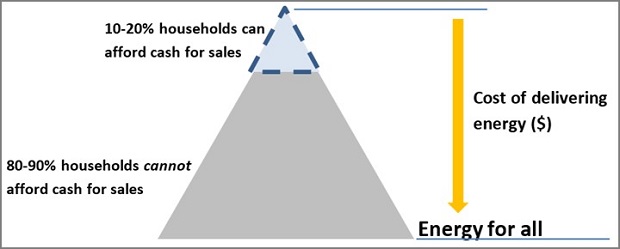
Capacity Building for Market Transformation in the Pacific Islands, 2013-2014
Empowering entrepreneurs to deliver sustainable energy services for all
1. Innovative business model for delivery of solar lights for off-grid areas and training of entrepreneurs:
The value of capacity building has been clearly demonstrated on an outer island of Vanuatu, Tanna Island, where 20 entrepreneurs were assisted by IRENA to roll-out a pilot project for solar lighting to replace expensive and harmful kerosene in 200 households. The project is one of the few subsidy-free models based on an “energy lending” principle, rather than a “cash sale” model, allowing it to reach the poorest households in Tanna Island.

Energy for all requires deep market penetration which requires long-term financing and cannot be achieved by cash sales only (adapted from K. Chen from Village Infrastructure Angels).
In partnership with Village Infrastructure Angels, the project leveraged private funding for the successful installation of 200 solar home systems serving the same number of households in two villages on Tanna Island, Vanuatu. IRENA supported the capacity building component of the project, including designing progressive training programmes, using the local language whenever required and periodically monitoring the performance of entrepreneurs, loan collection rates and customer satisfaction.

Middlebush training session with Isso Kapum talking to operators.
Along with providing extra hours of efficient lighting at night, the capacity building component of the project helped retain newly acquired knowledge and skills in the community. Fully owned by villagers, the project can grow organically based on their needs.
Capacity Building for Solar Agro-processing in the Pacific FINAL REPORT

An islander installing inline fuses in batteries.
2. Capacity Building for Solar Agro-processing in the Pacific Islands:
In addition to utilizing renewable energy for lighting applications, IRENA supported a similar “lending model” with extensive capacity building component for productive usages of solar in the agro-processing sector, for food products, such as coconut, rice, maize and cassava. In many villages in the Pacific, manual labour still dominates agro-processing. Reducing the time spent – mostly by women - on these laborious manual tasks could open up opportunities for increased productivity and income-generating activities.
In recent years, the price of solar power has dropped dramatically, allowing for market competition with diesel-based agro-processing machines. In partnership with Village Infrastructure Angels, IRENA supported the capacity building activities targeting elimination of diesel and manual labour in 50 households of Vanuatu and Papua New Guinea, while developing local entrepreneurship capacities. The funding from IRENA was used to train local entrepreneurs on how to manage and grow a solar agro-processing business.
The solar agro-processing project yielded 7 mill installations, well above the target of 2 mills, and, of these, 3 mills show immediate promise, namely: the solar rice hulling in Papua New Guinea, solar coconut graters in Vanuatu and solar cassava graters in Vanuatu.


Coconut grating mill and another mill grinder set up with battery and inverter.